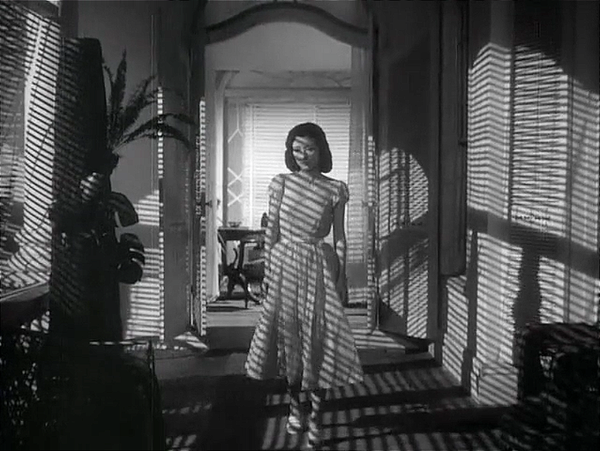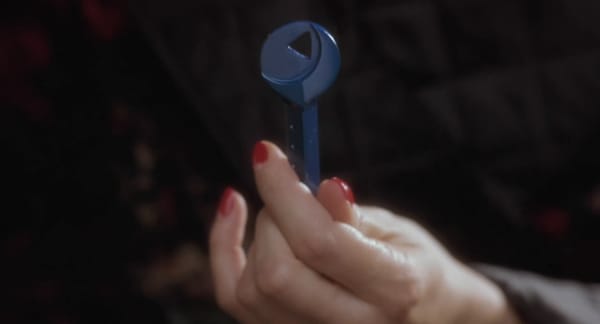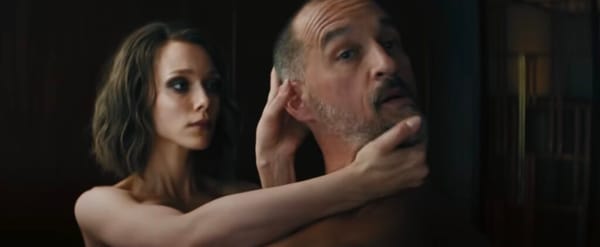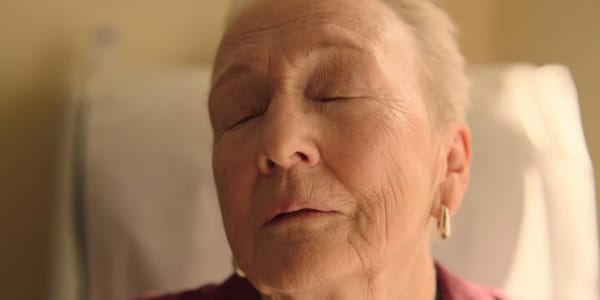What To Watch: Whistling in the Dark Edition
Reviews of "The Pale Blue Eye," "Broker," "A Man Called Otto," "Nanny," and more.

There are some decent movies arriving in theaters and on demand this week, but the most transfixing entertainment – the most simultaneously hilarious and depressing – has been the Schadenfreude Sh*tshow Follies currently unfolding in the US House of Representatives, where Kevin McCarthy is being consumed, inch by peristaltic inch, by the boa constrictor he has spent years trying to befriend. (It’s a good thing he doesn’t have a spine; he’ll go down easier.) I wonder about the high-school history students who are watching this demonstration of epic entropy in action and whether they are thinking, Jesus, I could do better than these clowns and someday I will, or, I am witnessing the collapse of the American experiment in real time. In other words, Is this the end of something or the beginning of something else? It depends on whether our legislative system is controlled at the end of the day by those who want to employ it or those who want to destroy it. We’ll know soon enough, but for now it’s like watching a drunken waiter careening toward us with a tray piled high with dishes: Either it’s all going to end in a disaster of blood and broken crockery, or through some miracle we’ll make it to the end of the meal alive.
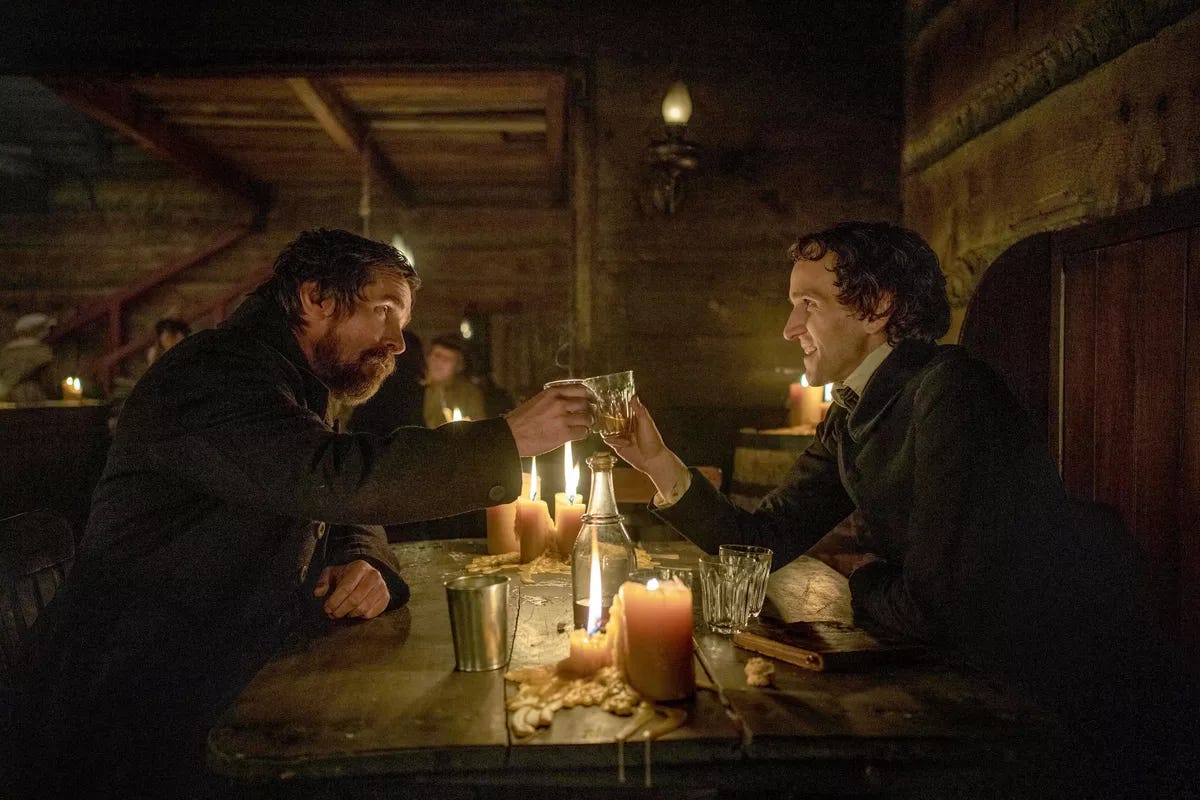
But movies, okay, sure, movies. The best part of “The Pale Blue Eye” (⭐ ⭐ 1/2, streaming on Netflix) is the center-ring acting smackdown between Christian “Method Man” Bale (above left) and Harry “The Dynamite Kid” Melling (above right), a battle royale of brooding charisma vs. flamboyant hambone. Based on a novel by Louis Bayard, Scott Cooper’s film is set in 1830, at a wintry West Point Military Academy swaddled in mist and almost completely desaturated of color. A cadet has been murdered, a celebrated police detective lives nearby, the game is afoot. Bale plays the sleuth with a mouthful of beard and a mournful sense of purpose; he’s wilier than the stiff-backed military men who have brought him in but intrigued by one of the victim’s fellow cadets, an eccentric young man named Edgar Allan Poe (Melling), who becomes a campy, high-spirited Watson to the detective’s Hudson Highlands Holmes.
“The Pale Blue Eye” is awfully self-serious, and in the final half hour it paints itself into a corner of utter preposterousness (and then throws in a final twist after that). Up to that point it’s a slow but steady watch, with an assortment of stellar names popping up in support: Timothy Spall as the Superintendent, Toby Jones (“First Cow”) as a fussy West Point medic, Gillian Anderson having the vapors as his wife, Charlotte Gainsbourg as a tavern wench, British playwright-actor Simon McBurney as an officer – and I had to get to the credits to realize that was 92-year-old Robert Duvall under heavy whiskers as a conveniently local authority on satanic cults. It’s nice to see Boo Radley’s still hard at work.
Bale is not exactly a shrinking violet when it comes to acting overkill, but he allows himself to be upstaged, happily, by Melling, whom your kids know as nasty Dudley Dursley in the “Harry Potter” movies and who has since matured and thinned out into an actor of odd, angular magnetism. He very much resembles Edgar Allan Poe here – or a young, puppyish version of the writer – and if his Southern accent is a little heavy on the Blanche DuBois, that matches the other liberties taken with the facts of Poe’s life. Anyway, “The Pale Blue Eye” isn’t biography but invention, and Melling is the merry wind-up toy at its center. Watch it for him and for the way Bale anchors the younger man’s performance to the movie’s here and now.
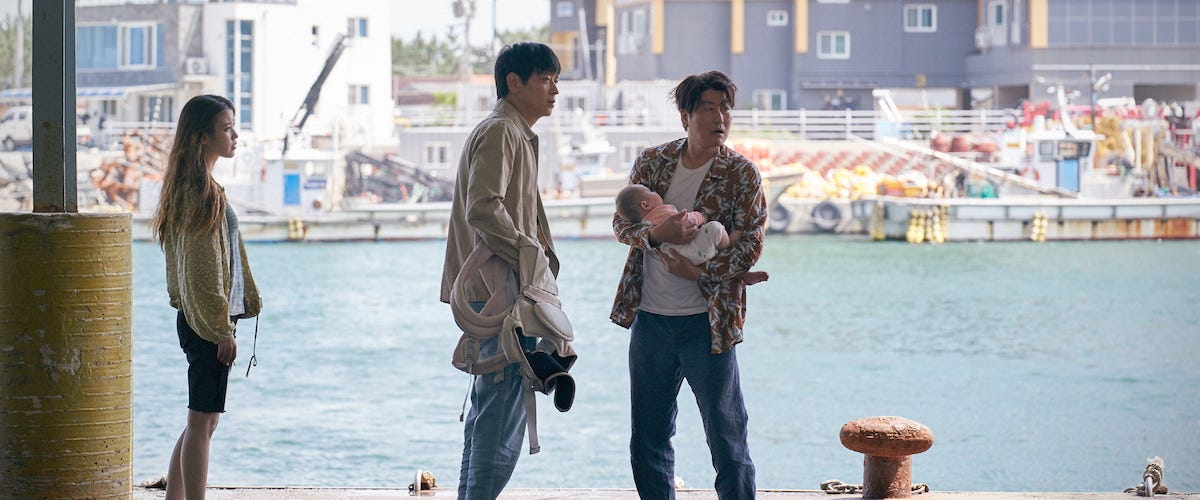
“Broker” (⭐ ⭐ ⭐ 1/2) is expanding to local arthouse theaters this weekend; it’s the latest from the prolific Japanese writer director Hirokazu Kore-eda, whose wonderful 2018 drama “Shoplifters” won the Palme d’Or at Cannes and was nominated for a Foreign Language Oscar. Kore-eda almost obsessively makes movies about troubled characters who find solace in improvised families, and “Broker” is more of the same – if you liked “Shoplifters,” you’ll like the new film, which at times almost plays like a remake. (Kore-eda has described it as a “companion piece.”) Filmed in South Korea, it stars Song Kang-ho (above right) – the con-artist dad in Bong Joon-ho’s devilish “Parasite” – as a laundry owner with a side hustle in selling abandoned babies on the black market. He and his hapless partner (Gang Dong-wan, above center) are tailed by two lady police investigators (by-the-book Bae Doona and laissez-faire Lee Joo-young) and confronted by a young mother (Lee Ji-eun, above left) desperate to get her baby back. What in other hands might be a suspense thriller or a melodrama becomes a Kore-eda special: a road movie, a melancholy comedy, and a moving testament to the human need to gather in together. It’s the same recipe as “Shoplifters,” with the same ingredients, but it tastes just as good the second time around.
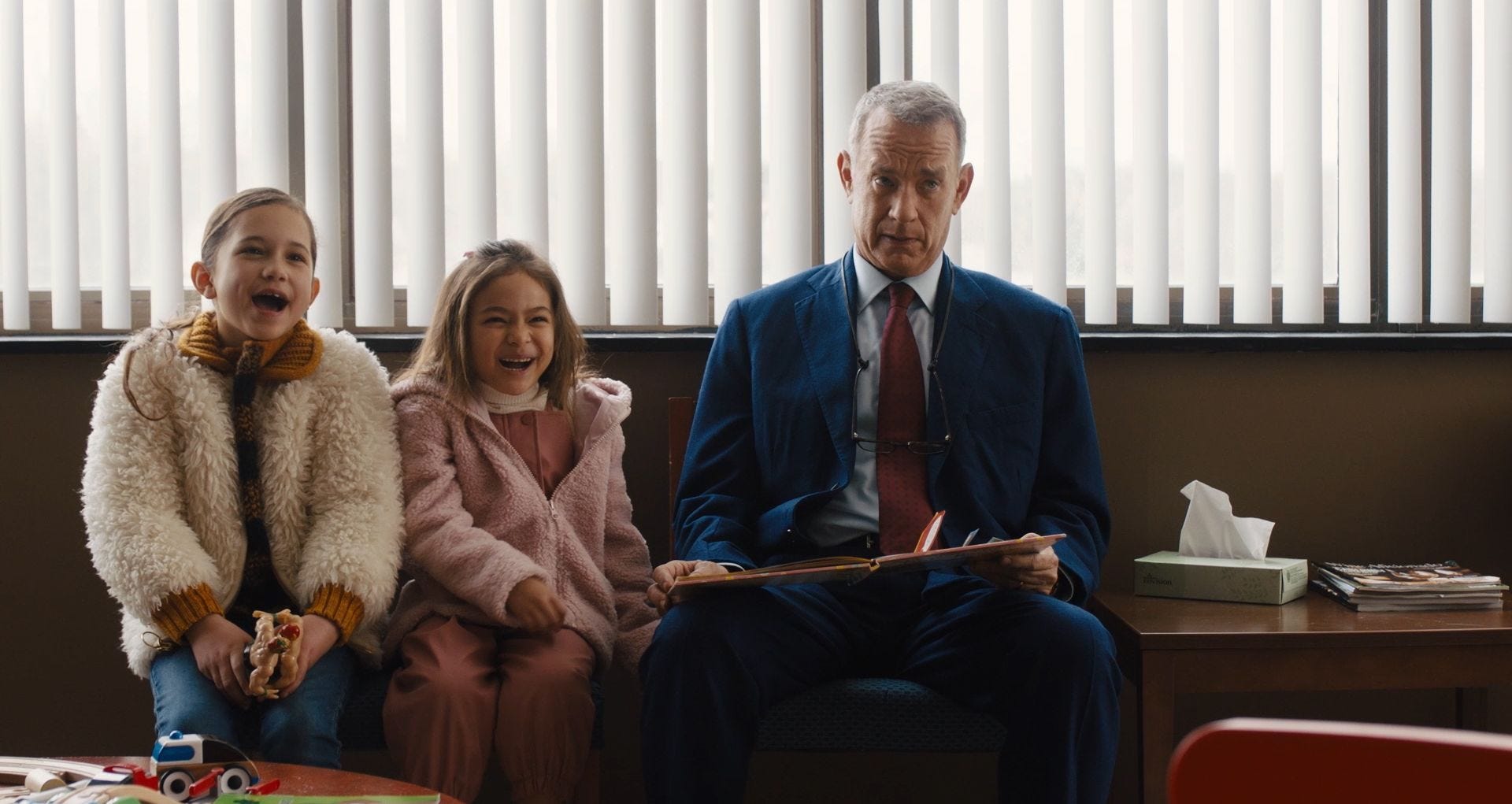
Whereas “A Man Called Otto” (⭐ ⭐, in theaters), a remake of a 2015 Swedish film that was based on a 2012 Swedish hit novel, feels like stale, soupy leftovers. It’s one of those heartwarming sagas of an old Scrooge who learns to thaw out and lighten up when he meets a life-affirming character or three, and the original, “A Man Called Ove” (also an Oscar Foreign Language nominee), kept sentimentality at bay – barely – through a tart script and the dyspeptic charms of star Rolf Lassgård. The Scrooge in question, a community watchdog and neighborhood grouch mourning a recently deceased wife, is now played by Tom Hanks (above), who keeps the character’s thorns good and sharp – it’s a nice changeup from the star’s heroic turns as everyone from Captain Phillips to Mr. Rogers. The thorn-pruning is mostly in the direction by Marc Forster (“The Kite Runner,” “Monster’s Ball”) and the script by David Magee (“Mary Poppins Returns,” “Life of Pi”), proficient Hollywood hacks who know how to turn best-selling novels and overseas film hits into easily digestible comfort food.
“A Man Called Otto” is easily digestible, pleasant, and bland, with the only real lump in the batter the decision to cast Hanks’ real-life son Truman as the young Otto in flashback sequences. It’s the 27-year-old Truman’s first acting job – he’s worked on camera crews before this – and he seems a nice-enough guy who possesses none of the presence or snap his father brings to the screen. By contrast, Mexican actress Mariana Treviño is a delight as Otto’s new neighbor, a busybody immigrant mom with two cute little girls and a third child visibly on the way. Forster and company strain to yank the tears from our eyes in the final scenes, and damn it, my tears were yanked once or twice, not through the shameless pandering of the script but through the simple emotional honesty of Treviño’s playing. Take that as a recommendation or a warning.
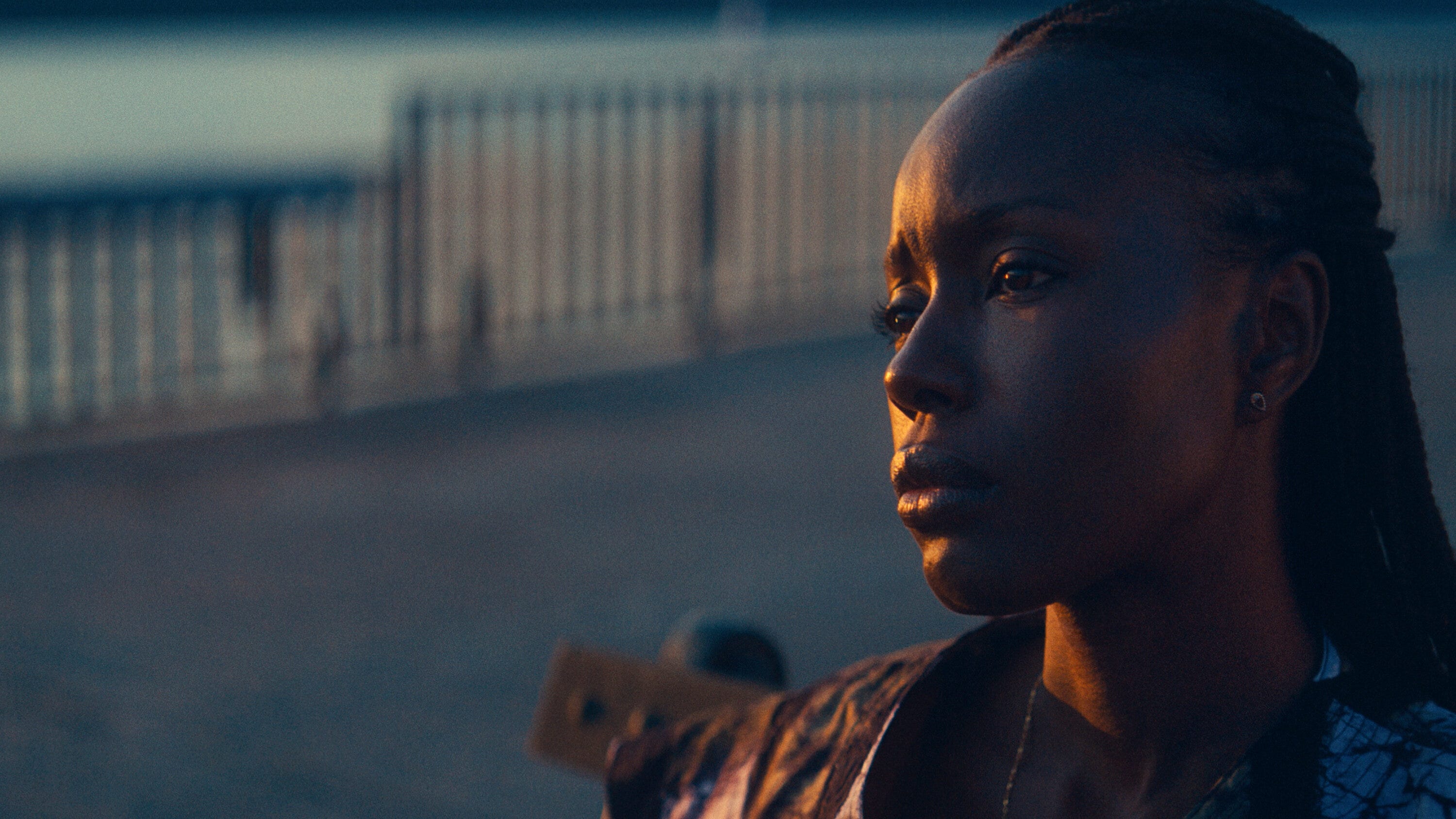
Playing catch-up with recent VOD releases: Streaming on Amazon Prime Video since mid-December, “Nanny” (⭐ ⭐ ⭐) is an eerie, dreamlike drama of cultural displacement, class exploitation, and mythic surrealism – a strong feature debut (and 2022 Sundance prizewinner) from Sierra Leonean-American filmmaker Nikyatsu Jusu. An intensely sympathetic Anna Diop (TV’s “Titans”) plays Aisha, a Senegalese nanny in New York City, caring for the young daughter of a high-strung Manhattan couple (Michelle Monaghan and Morgan Spector); what could be (and is) a straightforward dramatization of the immigrant child-care industry and its capitalist/racist underpinnings tilts into stranger territory when Aisha starts having terrifying visions, some having to do with the young son (Jahleel Kamara) she hopes to bring to America. Is she going insane (Jusu preys on audience memories of tabloid nanny nightmares) or is she being haunted? Even if you’re familiar with such African folkloric figures as the trickster Anansi or the water spirit Mami Wata, “Nanny” crosses the line from oblique to obscure more than once, but it’s reined in by Diop’s translucent performance, by Sinqua Walls as a charming and trustworthy love interest, and by actress-singer Leslie Uggams, regal as an elderly seer who knows something about motherhood and the Motherland. Recommended.
One of the more razor-sharp of last year’s late releases, “The Menu” has recently arrived on HBO Max (and as a $14.99 digital rental on Amazon, AppleTV, YouTube, and elsewhere). I reviewed this coolly satiric takedown of foodie pretentiousness and upper-class perfidy when it came out in theaters just before Thanksgiving, and while I found it on the light side then, it has settled well and continues to leave an acerbic aftertaste, prompting me to bump my initial ⭐ ⭐ 1/2 rating to ⭐ ⭐ ⭐. Feel free to go higher or stick with the comfort food.
Classic(s) of the Week(end) — Friday 6:15 p.m. on Turner Classics: “The Mortal Storm” (1940), the culmination of the channel’s tribute to director Frank Borzage and the closest pre-war Hollywood came to acknowledging what was going on in Hitler’s Germany. Jimmy Stewart and his greatest co-star Margaret Sullavan play young lovers who, in a scene I never thought would be relevant again, are hemmed in by a thicket of upraised Nazi salutes. (Not available for VOD rental elsewhere.)
Saturday 10:00 p.m. on Turner Classics: “I Know Where I’m Going!” (1945) – From England’s Archers (writer-directors Michael Powell and Emeric Pressburger), one of the greatest of all romantic comedies, grounded by the losses of the war just ending and lifted up by the misty, mystical charms of the Isle of Mull off the coast of Scotland.
Thoughts? Don’t hesitate to weigh in.
If you enjoyed this edition of Ty Burr’s Watch List, please feel free to pass it along to friends.
If you’re not a paying subscriber and would like to sign up for additional postings and to join the discussions, here’s how:


